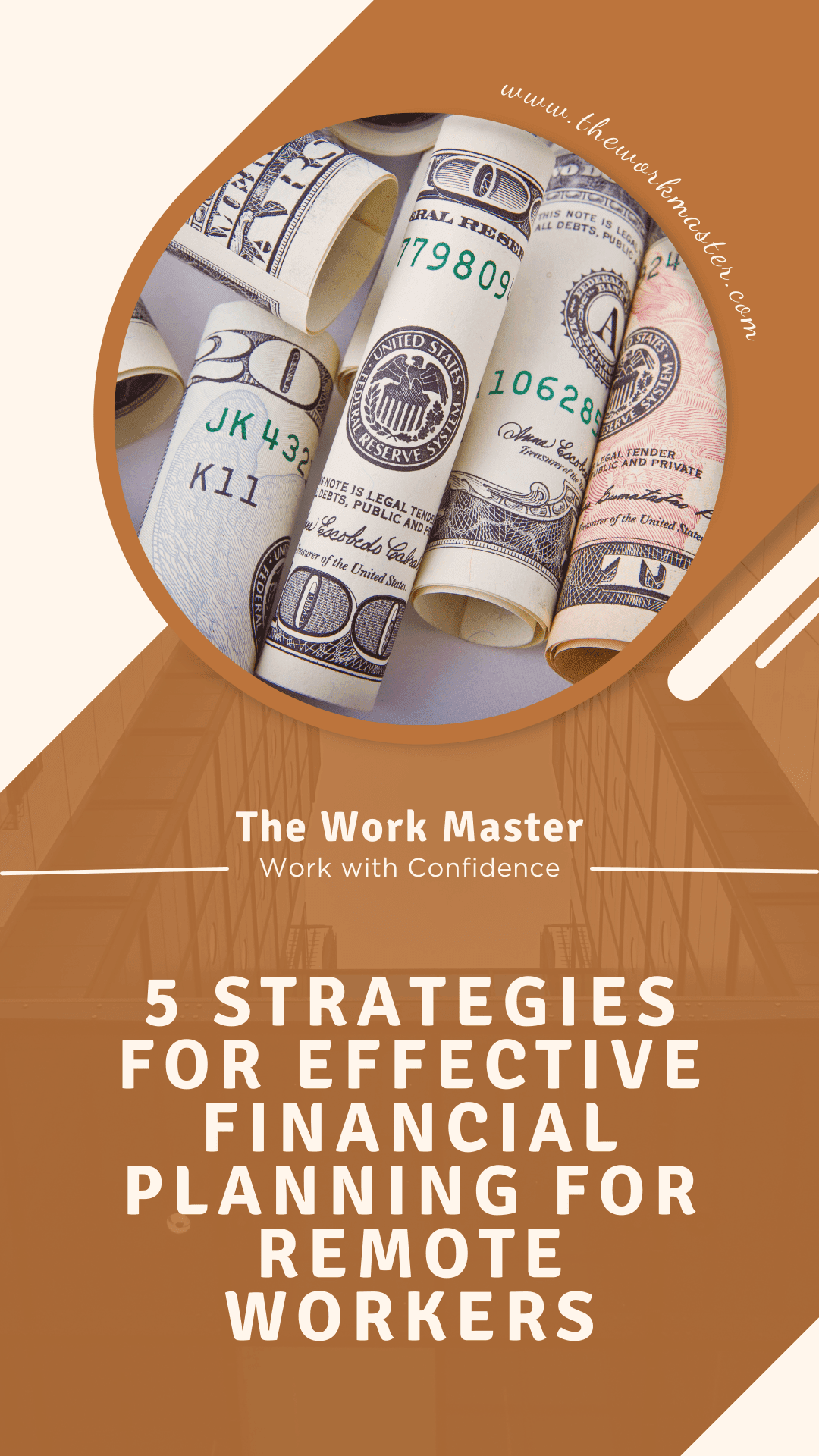My wife and I love being remote workers - what started out as a necessity in 2020 has become our new normal.
I’ve traded in a daily commute for extra time with my daughter, giving back to those around me, and blogging to help others better understand personal finances.
5 Strategies for Effective Financial Planning for Remote Workers
While the news headlines have been riddled with companies forcing employees back to the office over the past several months, remote work is still rising.
Many professionals are embracing the freedom and flexibility from remote work, and certain employers are enjoying lower overhead costs. I believe the future is bright for those that embrace remote work. A recent article by Forbes confirmed three very encouraging statistics about remote work:
- 12.7% of all full-time employees are working remotely in 2023
- By 2025, 32.6 million American will be working remotely
- 16% of companies are currently operating on a remote-only model
The above stats confirm that not only is remote work on the rise over the past few years, there is still room to grow.
It will take a long time for remote work to take the majority, but I believe it will get there. In the meantime, there are millions of opportunities to explore if you’re interested in working fully remote.
With the freedom of remote work comes a great responsibility - properly managing your finances. The more proactive you are the better.
The fact that you’re reading this article is a great step in the journey to financial freedom. I hope this writing equips you with five helpful tips for effective financial planning for remote workers.
1. Create a Budget
Creating and managing a budget is necessary to understand where your money is going. This understanding will help provide financial stability and peace of mind, especially if you work in an industry where your income may vary month-to-month, such as sales, real estate, or recruiting.
There are several budgeting strategies to consider, my favorite to start with is the 50/30/20 budget. When using the 50/30/20 budget, you allocate 50% of your income to needs, 30% to wants, and 20% to debt management and saving.
The need category includes items such as housing, utilities, and groceries. Wants are items such as vacations and eating out.
Debt management and savings include paying down credit cards and investing in a 401k. Use these percentages as a starting point.
The more you can put towards debt management and savings, the faster you can get out of debt and pursue financial freedom.
When creating your budget, start by tracking your income and expenses. I personally track every expense that our household spends each month.
This helps me understand our spending habits and determine ways to cut expenses. I’m a huge fan of Excel - using a spreadsheet allows me to personalize my tracking and I don’t have to worry about a large company having my financial data. There are a plethora of free tools and apps available though if you’d prefer.
2. Savings
Prioritizing saving is a key strategy as a remote worker - it provides you with a financial safety net in case your income drops unexpectedly.
Two key areas to start when creating your savings plan are automation and building an emergency fund. Having the power to automate your savings is a game changer.
Working remotely is extremely fast-paced and it is easy to overlook making regular savings contributions if you aren’t careful.
By automating your savings, you’re able to set aside a predetermined amount of funds on a regular basis without having to remember to do it manually.
This reduces cognitive load, allowing you to focus on other important tasks. An emergency fund is money that you set aside to cover your expenses in time of need, such as getting laid off from your job.
This money is there to cover everything from rent to medical bills, so it’s important to build and maintain a healthy emergency fund.
The first step is determining how much you’ll need. At this step, you’ve hopefully determined how much you need each month to get by.
If not, take a few minutes to review your expenses. Once you’ve determined your monthly expenses, you’ll need to determine how many months you want to cover.
Multiply them together and that’s how much you’ll need for your emergency fund. Everyone has different approaches to how much to save in an emergency fund, the most common advice that you’ll run into is to have three to six months of expenses saved.
For example, if your monthly expenses equal $3,000, you’ll need to save between $9,000 and $18,000 in an emergency fund.
This can vary by industry, so if you work in a very specialized field you may want to consider a larger emergency fund if you believe it will be difficult to find work.
3. Investing and retirement
As a remote worker, investing in your financial future is a fun and rewarding task. By investing diligently, you have the opportunity to grow your wealth over time.
This will help to secure your future retirement and achieve any other long-term goals you may have. Consider investing money as a promotion for saving money.
Instead of merely saving cash, you’re putting it to work for you to generate returns. By starting early, you can tap into the power of compound interest and long-term market growth, allowing you to reap the rewards when you need it later.
There is a wide array of investment products to consider when planning for your retirement. If you’re working remotely for a company, contact your Human Resources partner to determine what plans are offered and if the company offers any contribution matching.
A common product that many companies offer is access to a 401(k) plan. These tax-advantaged plans defer taxation until withdrawal, meaning that contributions can reduce your taxable income and your accounts will grow tax-free.
If you’re self-employed, there are a few options to look into. First up, is the Solo 401(k). This retirement savings account is designed for solopreneurs.
The only exception is if you employ your spouse. A huge perk of this is that you’re able to contribute as both an employee and an employer, meaning that you can put even more away per year for retirement.
If you’ve expanded beyond just yourself, consider a Simplified Employee Pension Individual Retirement Account (SEP IRA).
It’s a great option to contribute to your employees' accounts from an employer standpoint and are tax-deductible.
Anyone with earned income can contribute to a Traditional Individual Retirement Account (IRA), which is typically tax-deferred, similar to a 401(k).
Other accounts to consider include Roth IRAs, Health Savings Accounts, and 529 plans. Roth IRAs are an amazing investment vehicle for retirement.
You contribute using funds that have already been taxed, but growth and withdrawals are all tax-free. Health Savings Accounts are a great way to put money aside for medical-related expenses and are tax-deferred.
Finally, if you have children, consider investing in a 529 plan to save for future educational expenses.
I recommend conducting some research online and consulting a financial advisor or other qualified professional to help with your financial planning needs.
4. Diversify income
Most remote workers will agree, working remotely means more flexibility, especially if you’re good at time management.
This flexibility and freedom allows you to trade your time normally spent commuting towards other things, including diversifying your income streams.
Having a diverse set of income streams will not only help you prosper financially but weather economic downturns as well. Here are five options to consider:
- Moonlight as a freelancer: there are freelance opportunities for all sorts of skills nowadays, from writing copy to analytics to social media management. Check out platforms such as Upwork and Fiverr to market your skills.
- Help others by consulting or coaching: offer your knowledge to individuals or businesses. From wellness coaching to small business management consulting, there is a wide range to choose from.
- Create an online course: if you have a specific skill set that is in high demand, consider recording a few course videos online to sell. This is a great way to earn passive income.
- Open an e-commerce store: have a passion project that you believe you could sell? There are easy-to-use platforms now such as Shopify and Etsy help you sell goods online. Great examples include photography and print-on-demand clothing.
- Affiliate marketing: if you have a passion for content creation, whether video, writing or a combo, consider affiliate marketing. When successful, you refer your audience to a specific product or service and get a small commission in the process.
5. Educate yourself
One of the most important strategies on this list - take the time to educate yourself. I realize that personal finance isn’t the most fun topic for everyone (my wife included), but it’s so important for our long-term wellness.
Even if it’s just once a week, set a regular cadence to learn something new. Our easy access to free information can be a blessing and a curse.
On one hand, a simple Google search will lead you to thousands of hours of free readings and videos on personal finance.
This includes financial blogs and websites, online courses, podcasts, and books. The challenge is sifting through the sales pitches and fake news to find actual valuable information.
Before taking the time to learn from a specific source, take some time to determine how credible the source is.
There are many trusted brands out there which provide great information for free - Investopedia, Nerdwallet, and LendingTree are a few.
If you have a great relationship with your bank, check their website for free online resources. If partnering with a financial planner or advisor, ask them for resources. Trust your instinct, if what you reading feels like a sales pitch or clickbait, go elsewhere.
A final thought…
Our lives change over time, and so should your personal finance strategy. This is especially true for remote workers, as our lives tend to be less structured than our in-office counterparts.
Don’t be confined by your initial strategy. Pick a direction, try it for a few months, and then adapt as needed. It is not set in stone.
Jeremy's Bio:
Grab our free hand-picked
list of remote jobs now!
*Includes 148 websites with multiple remote
job offers organized into 7 categories.
Bonus: You'll receive updates on new free resources as soon as they are live.
+ Best remote job recommendations and little-known freelancing hacks for time-saving.




.jpg)